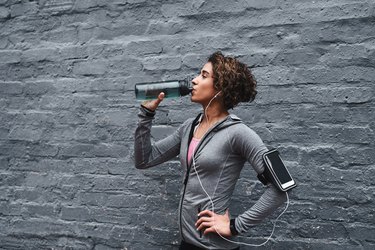
If your stomach feels full after drinking water, you may have experienced water bloat. Water fills up your stomach, so it's often a major cause of bloating. This uncomfortable feeling of fullness can happen after eating, too. Bloating may even impact your daily life and make you feel insecure.
Women are especially prone to this problem due to their menstrual cycle, which is why many women seek answers to the causes of bloating and how to prevent it.
Video of the Day
Video of the Day
Tip
When you drink water, it travels down to your stomach. Drinking lots of water can make you feel and look fuller, but it's quickly absorbed, so water bloat is usually temporary.
Causes of a Bloated Stomach
Bloating is often confused with water retention, weight gain and being full. However, these conditions are not the same as feeling bloated. So, what is bloating? According to the American Academy of Family Physicians, bloating occurs when the digestive tract is filled with air or gas.
Some medical conditions, such as irritable bowel syndrome (IBS), can exacerbate bloating. Experts at the Cleveland Clinic consider underlying diseases, such as Crohn's disease or colon cancer, to be sources of some people's bloating sensations. Menstruation can also contribute to a distended stomach.
Certain eating and drinking habits can further increase the chances of bloating. These habits either cause gas or encourage air to enter and fill the stomach. For example, consuming foods that cause gas and drinking through a straw can cause bloating because these habits allow the stomach to fill with air.
Drinking and Water Bloat
When you drink water, it travels down the esophagus and into the stomach. From there, it's absorbed into the bloodstream where it's used to hydrate the cells. However, this process is slow, so water will likely collect in the small intestine while the body registers that it's available. This can explain why your stomach feels full after drinking water.
Water bloat is also described as distension of the stomach, which has been linked to excess fluid in the digestive tract. In a 2012 study published in ISRN Gastroenterology, researchers found that an increased volume of fluid is retained in the small intestine and leads to bloating. They found that the excess water is absorbed overnight, explaining why a bloated stomach at night is often flat by morning.
Water bloat is different from regular bloating — which involves excess air or gas in the stomach — but it's still a cause of stomach distension. Though it can be uncomfortable, water bloat usually goes down after the water is processed by the body.
Prevent a Bloated Stomach
Some medical conditions are more prone to bloating, but bloat caused by daily water intake is manageable and may even be preventable. Simply keep in mind some ways to prevent it:
- Avoid sparkling water whose air bubbles can cause the GI tract to become filled with air.
- Don't drink water through a straw. This allows more air to enter the stomach.
- Sip rather than chug your water.
- Spread your water intake throughout the day instead of drinking a lot of water at once.
Your body needs water to function, so don't cut back on your water intake to prevent having a bloated stomach. Even when you do experience water bloat, just be patient — it'll go away.
Was this article helpful?
150 Characters Max
0/150
Thank you for sharing!
Thank you for your feedback!